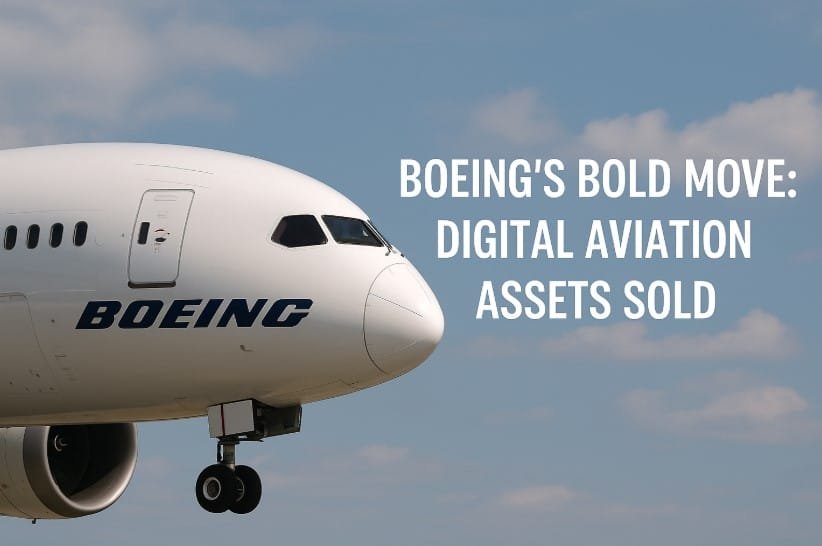Now Reading: Boeing’s Bold Move: Digital Aviation Assets Sold
- 01
Boeing’s Bold Move: Digital Aviation Assets Sold

Boeing’s Bold Move: Digital Aviation Assets Sold
What Just Happened With Boeing?
You may have seen the headlines buzzing about the Boeing digital assets sales: Boeing has just sold its digital aviation assets. Sounds like a big deal, and it is but what does that really mean? And why should you care?
The reason is plain and simple: Boeing, the giant company known for building airplanes, just made a bold move by selling off a big chunk of its digital aviation business to a private equity firm called Thoma Bravo. This deal is what people are now calling the Boeing digital aviation sale. And yes, it’s got the aviation and tech worlds talking.
Now, if you’re thinking, “Wait, I thought Boeing only made planes,” you’re not alone. Most people know Boeing for its jets, like the 737 or the Dreamliner. But behind the scenes, Boeing has also been building smart digital tools that help airlines fly more efficiently. Think flight planning software, fuel-saving apps, and data systems that help pilots and airlines make better decisions. These tools don’t sit in the cockpit, they’re more like the brainy assistants working quietly in the background.
So, why sell them?
Well, Boeing has been going through a bit of a rough patch lately, between pandemic slowdowns, supply chain hiccups, and some high-profile safety issues. They’ve been trying to get back to basics and focus on what they do best: making safe, reliable aircraft. That’s where this Boeing digital aviation sale comes in. By offloading these digital assets, Boeing is freeing up time, money, and brainpower to double down on its core mission.
The company that bought these assets is Thoma Bravo. If you haven’t heard of them, don’t worry, we’ll get to know them better in the next section. For now, just know that this acquisition means Boeing’s tech tools didn’t just vanish. They’re in new hands and ones that specialize in growing and improving tech businesses.
In short: Boeing just made a big shift, and it’s one that could change the future of aviation tech. Whether you’re into planes, tech, or just love a good business shake-up, this Boeing digital aviation sale is something to keep an eye on.
What Are Digital Aviation Assets Anyway?
So, now that we know Boeing sold some digital aviation assets, you might be wondering what the heck are those, exactly? These aren’t the kind of things you can touch or see like a plane wing or a cockpit switch. They live in the digital world, but they have a big impact on how planes fly and how airlines operate.
Let’s imagine this: running an airline is kind of like running a really complicated road trip but in the sky. You’ve got to figure out the best route, how much fuel to take, how to avoid traffic (in this case, storms or crowded skies), and make sure everything runs on time. That’s where digital aviation tools come in.
Over the years, Boeing created a bunch of smart software and data systems that help with all that. These tools track flights, predict maintenance needs, optimize fuel use, and even help pilots get the smoothest flights possible. It’s like having a supercomputer co-pilot helping airlines save time and money.
So, when we talk about the digital aviation sale, we’re talking about Boeing handing off this toolbox of tech to someone else—Thoma Bravo in this case, so they can keep building and developing on it.
Think of it like this: imagine you built an awesome smart home system that controls lights, heating, security, and even suggests what to cook for dinner. But now you want to go all-in on building houses, not running the tech inside them. So, you sell your smart system to someone who lives for tech. That’s basically what Boeing did with this acquisition.
The assets may not be as flashy as the jets, but they’re crucial behind-the-scenes players. And with Thoma Bravo now in charge, we could see even cooler upgrades and innovations ahead. The tools are still flying high, they’ve just got a new captain.
Let Us Meet Thoma Bravo, The New Owners In Town
Alright, time to talk about Thoma Bravo. If you’re scratching your head thinking, “Who’s that?”, don’t worry, you’re not alone. They’re not exactly a household name unless you’re deep into the world of tech investments. But they’re a big deal, and here’s why this Thoma Bravo acquisition matters.
Thoma Bravo is a private equity firm, which is just a fancy way of saying they buy businesses, especially tech companies and help them grow like crazy. Think of them like business personal trainers. They spot companies with potential, pump resources into them, and help them become faster, stronger, and more competitive.
So, when the Boeing digital aviation sale was announced, Thoma Bravo didn’t just swoop in for a quick flip. Nope, they saw real long-term value. Remember all those digital tools we talked about? The ones that help airlines fly smarter and more efficiently? Thoma Bravo wants to build those out even further.
It’s kind of like if someone bought a half-finished app that already helped people save gas on road trips and then added voice commands, real-time weather alerts, and a super sleek user interface. That’s the kind of energy Thoma Bravo brings. They’re not just buyers; they’re builders, too.
The interesting thing is that Thoma Bravo has done this before. They’ve taken other tech companies under their wing and turned them into major players. They understand software, and they move fast. So, Boeing’s digital aviation tools might just get the glow-up they deserve.
This Thoma Bravo acquisition could be a win-win because Boeing gets to focus on making planes, and Thoma Bravo gets a head start with a solid, proven tech base they can take to new heights.
At the end of the day, this isn’t just some behind-the-scenes business deal. It’s a shift that could change how airlines use tech in the years to come. And Thoma Bravo? They’re now officially in the pilot’s seat for this next phase.
Why Did Boeing Sell? The Big Picture
Here’s the million-dollar question: Why would Boeing give up such valuable digital tools? On the surface, it might seem like they’re letting go of a golden opportunity. But when you zoom out and look at the bigger picture, it actually makes a lot of sense.
Boeing has been through a lot in the past few years, delays, groundings, supply chain headaches, and of course, the pandemic didn’t help either. All that pressure made it clear: Boeing needed to refocus on what it does best, building airplanes and getting them safely into the sky.
That’s why the Boeing digital aviation sale was kind of like spring cleaning for the company. They took a good look at everything on their plate and decided to offload some of the “extras” to make space for what really matters: improving their core aircraft business.
And let’s be real, running both a manufacturing empire and a software division isn’t easy. It’s like trying to run a bakery and a tech startup at the same time. Both are great businesses, but they need very different skill sets and focus. By going through with the deal, Boeing can now pour all its energy into designing, building, and delivering planes while letting someone else take the tech tools to the next level.
For Boeing, it’s not about giving up. It’s about playing smarter.
And with Thoma Bravo stepping in to supercharge those digital tools, this could be the best outcome for everyone involved. Boeing gets leaner and more coordinated, Thoma Bravo gets to innovate. And airlines? They get better tech, faster.
What It Means for the Future of Aviation Tech
Now that we know what Boeing sold, who bought it, and why it all happened, let’s talk about where this is all going. Because this Boeing digital aviation sale isn’t just about a business transaction. It could reshape how airlines use technology in the sky for years to come.
With Thoma Bravo’s acquisition, we’re likely to see these digital tools grow faster and smarter than they could have inside Boeing. Why? Because Thoma Bravo lives and breathes tech. They have the resources and the focus to push updates, build new features, and help these aviation systems evolve at lightning speed.
Imagine a future where flight software doesn’t just help with planning and fuel savings, but actually uses AI to learn from every single flight. Planes could fly more efficiently, avoid turbulence better, and reduce emissions, all thanks to upgraded digital systems. That’s where we could be headed now that Thoma Bravo is in the pilot’s seat.
And airlines? They’re going to love this. More reliable data, more automation, less downtime because it’s like upgrading from a flip phone to a smartphone, but for aviation operations. This Thoma Bravo acquisition could help airlines save money, improve safety, and offer smoother flights for passengers.
As for Boeing, stepping back from the digital side means they can put more energy into what they’re known for, making the world’s most iconic aircraft. It’s a strategic split, but one that could lift both sides higher.
So, whether you’re a tech lover, an aviation geek, or just someone who appreciates a smoother flight home, this is one shift worth keeping an eye on.
Final Thoughts
The digital aviation sale and the Thoma Bravo acquisition mark a major shift in how the aviation industry uses technology and it’s just the beginning. Whether you’re fascinated by planes, curious about tech, or just love seeing how big companies pivot, this new development’s got something for everyone.
What do you think about Boeing’s big move?
Was it the right call to focus back on building planes? Or are you excited to see how Thoma Bravo upgrades Boeing’s old tech into something even better? Drop your thoughts in the comments, we’d love to hear your take!
And hey, if you enjoyed this piece, don’t stop here. Check out our other articles for more easy-to-understand takes on the latest in tech, business, and aviation news. We’re all about making big ideas simple, and keeping things real.
Thanks for hanging out with us, see you in the next one!















